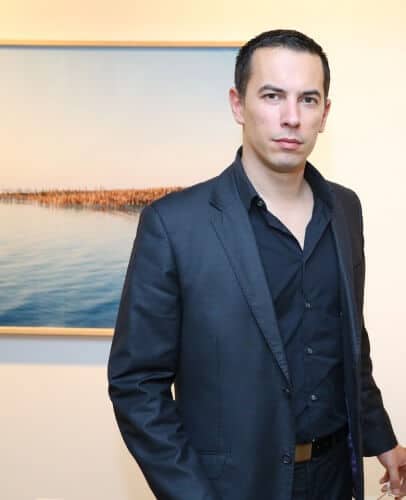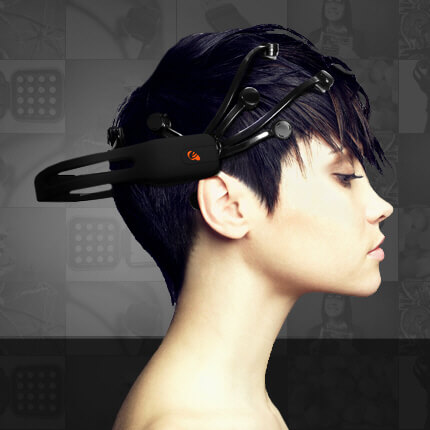This is the task of Prof. Olivier Ollier from the University of Marseille, who serves as a consultant to the governments of France, Switzerland and the United States, and uses a dedicated helmet to measure the brain activity of smokers and suffer from obesity, in order to combat these phenomena

Overeating and smoking addiction are two of the most difficult phenomena in recent years for public health and for countries, therefore it is important to understand how the addict's mind works, in order to establish a correct public health policy. This is what the scientist Prof. Olivier Oullier from the University of Aix-Marseille says in a conversation with the website. Prof. Oliya participated this week in the GO4EUROPE conference in Tel Aviv of Kokirman Investment House and Catalyst Fund.
Olya, the 38-year-old was the youngest participant in Davos last year. In 2011 he was chosen by the World Economic Forum (WEF) as a "young world leader". He is an international expert in behavioral research and neuroscience from Aix-Marseille University, and is completing a second PhD in economics.
Prof. Olya has a unique method for researching the brain and its dynamism in the process of making economic decisions, risk management, improving strategy and managing communication crises. He is the author of over 100 publications in the world. His research combines psychology, consumer behavior, behavioral economics and neuroscience in the social field and complex systems.
He is also a member of GREQAM, a research center that includes experts in various fields of economics, focusing on macroeconomics, econometrics (examination of economic models by statistical and mathematical methods), economic philosophy and public economics. He is also a member of the Center for Complex Systems and Brain Sciences.
"My background is in psychology, complex systems and neuroscience. The purpose of my work is to understand how our brain works when we make decisions but not only the neuroscience side. The psychological side here is just as important, especially when we want to connect the laboratory work with real life. And how can the laboratory work be linked to real life."
"We use medical equipment but also mobile equipment that is at the forefront of technology." Recently I was involved with a company EMOTIVE Life Science The company produces portable EEG systems, which make it possible to understand the behavior of people and the dynamics of the brain outside the laboratory, and in the framework of my work, to understand how decisions are made.
The idea is not only to consider neuroscience as a factor in itself but the brain within the body and in the physical, social environment and the complexity of the interaction, including the past, present and future of the individual, as well as society. We run the experiments in the laboratory, work on the theory and then we develop strategies that companies, institutions, non-profits, governments (I work with the French government) and other bodies, can use the new knowledge in behavioral and brain sciences to better understand why people cannot control their consumption their food, why it is so difficult for people to maintain sustainable consumption, and why it is so difficult to quit smoking."
What are the main findings?

"The main discovery is that there is an interdependence between emotions and rationality. Usually it was customary to separate these functions of the brain. That is why the concept of EMORATIONALITY was developed as a result of those brain experiments. In the experiments we put people in front of moral or economic dilemmas and understand that it is not just a calculation of how many lives you save compared to how many people will die when you are in charge of a certain area of the government. We are working on the use of neuroscience in the courts, I recently published a detailed article on this field for the French government. We are also working on the importance of physical presence in decision making. Something that challenges the model of rational decision-making. Among other things, we base ourselves on the pioneering works of the 2002 Nobel laureate in economics, the psychologist Daniel Kahneman."
How can your findings help?
"We help people control their impulses and not eat foods that are forbidden to them, or control smoking habits, and we do this with Immotiv's brain scanner. We are working on new solutions in neurofeedback. The idea is that you can't just ask people to change their behavior. It should be a systematic change. We need to cooperate with the industry and the government, a good example is a campaign in which I participate called Designed to move which helps to promote the issue of physical activity, and beyond that, to fight obesity and other health issues arising from lack of physical activity, this is an area that should not be ignored."
"The industry must also be involved. Enforcing food improvement can help but they also need to profit from selling healthier food. Enforcement works in the short term. We must work together with the food companies to find a long-term solution. We also need to help people because people are the ones who make decisions. It's not a fair market because the food industry has good advertising people that no government budget can compete with, but people have to take control,"
And how do you do it on a large scale?
"There is not much choice but to make this training accessible to many people. We conduct campaigns to prevent smoking and overeating and measure the results. In France, we have good results, obesity has stopped for the first time in many years."
"The problem of overeating exists in many countries where it is cheaper to eat at a fast food restaurant than to go to the supermarket, buy food and cook it at home. There is a correlation between the nutrition problem and the economy. Even in poor countries people rely on fast food. There are many environmental factors. There is also pleasure involved in eating, and this hedonistic aspect should also be taken into account."
"The direct and indirect cost of obesity (mainly the cost of health services, productivity, etc.) is on the order of one billion euros per year in a country like France. In any case, activity against obesity takes years, I have been in the field for 5-6 years. I am a partner in the effort to fight this."
"As for smoking, we are fighting, for example, with applications on cell phones of tobacco companies that do not respect the regulations in many countries. They are smart, we need to be smarter. Governments will never have more money than tobacco and food companies, but even though it's an unfair fight, you still have to work hard and you can win."
What are you doing on your visit to Israel?
"I came here as a professor at the University of Marseille and volunteer as an expert for PROVENCE PROMOTION - one of the sponsors of the go4europe event, an event aimed at encouraging cooperation and investments between Europe and Israel, organized by Kokirman Investment House and the Catalyst Fund. The role of Provence Promotion is to facilitate the move of companies to the south of France by providing various services at no cost. This is the main conference for cooperation between Israel and Europe, we are here to develop more ties at the business and scientific levels.
"We offer these companies a market opportunity, for example CE registration, to companies that want a foothold in the European market and the French market. It depends on the product, but Provence Promotion and the local authorities help to open subsidiaries, divisions, etc. We have good ties with Israel, we want to develop new ties but also maintain the old fruitful ties."

4 תגובות
the only chance is to find a way to explain to "normal" women how dangerous it is to keep eating like they do today.
In my humble opinion, the research is not what goes on in the heads of the addicts, but what goes on inside us - decision-making processes. The accepted way is to infer from the negative, just as brain research is not done on a healthy object but on a patient, and from the disease one deduces where it is working and what it is working on, etc.
From many impressions, it seems that the form of behavior between a person and his environment is going to change completely, partly due to the media revolution and partly because behavioral science has left the human power to create a machine.
If initially it will be a combination of man and machine, the man will use the machine's mobility, and later, a kind of hybrid creature with no clear limitations (not in external limits) but in the influence of the man on the surrounding and endalmusia will be created - what is a computer-emotion. Rejection of the belief system about information material for the brain. There is no end to claims accidents to the point of lack of control and endemalosis. What is clear is that human ethics will not exist,
It's not interesting and it's half bullshit.
Interesting, but what about gambling addicts? or alcohol